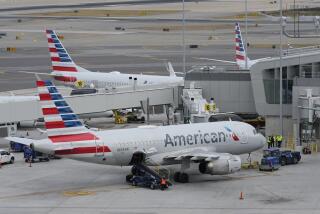United Raises Its Air Fares 5% on 80 to 90 Flights : American, Other Carriers to Follow Suit; Discount Rates Won’t Be Eliminated
- Share via
NEW YORK — United Airlines led the way Wednesday in a new round of fare hikes by major airlines, a move that was widely expected after consolidation in the industry knocked out most discount carriers.
United, the nation’s largest carrier, said it would raise fares about 5%, effective today, for 80 to 90 nonstop routes from its Chicago hub. American, Delta and Trans World Airlines followed suit on many of their own routes, although the effective dates varied.
“The product has been underpriced,” said United spokesman Charles Novak. “Business traffic looks good for the remainder of the fall . . . and we don’t think that we will dampen traffic with these modest increases.”
The airlines increased one-way ticket prices by $10 for coach and $15 for first class on trips under 1,000 miles. For trips over 1,000 miles, the increases are $20 for coach and $30 for first class. For example, United’s regular one-way fare between Chicago and Los Angeles will rise to $430 from $410 in coach and to $645 from $615 in first class.
Deep-discount fares, for tickets that must be purchased 7, 14 or 30 days in advance, are not affected. That means that most of the increases will be borne by business travelers. One analyst said about 92% of travelers today use some kind of discount.
‘Competitive Response’
American Airlines matched the new United fares on 79 of the 93 flights out of its Dallas/Fort Worth hub and 60 of its 74 nonstop flights out of Chicago. Spokesman John Hotard said the move was “definitely a competitive response.”
Delta and TWA said they would match the fares on routes where they compete with United. “We have been devastated in the first half of the year by low yields,” said Vincent Martinelli, TWA director of domestic fares.
Western Airlines said it was studying the new fares.
Analysts said the recent demise of Frontier Airlines and World Airways, coupled with the planned takeover of People Express by Texas Air Corp., eased competitive pressure on airline prices.
“The pressure for low fares from the bottom is easing. I think this (increase) is an attempt to recapture some of the revenues lost through excessive discounting over the past year,” said Louis Marckesano, airline analyst with the Philadelphia brokerage of Janney Montgomery Scott.
He added, however, that discounts will not disappear. “The airlines will continue to use discounts as marketing tools to encourage travelers with discretionary monies to spend.”
New Phase of Deregulation Era
Marckesano said that by increasing ticket prices, the airline industry is moving into another phase of the deregulation era that started five years ago. He said the “wild fight” for market share between upstart and old-line carriers has ended as the established airlines made the necessary adjustments in labor costs to compete. Now, he said, the industry should stabilize.
Airline stocks rose Wednesday in active trading after four prominent Wall Street analysts recommended them. AMR (American’s parent) gained 2 1/8 to 58 7/8, UAL (United’s parent) jumped 2 to 59, Delta was up 1 1/2 to 45 3/8 and TWA rose 1/2 to 26 1/8.
Hans Plickert, airline analyst with E. F. Hutton in New York, said airlines such as American, Delta and United have been reporting strong traffic figures since mid-July. The impending disappearance of People Express and the higher fares “made us more positive,” he added.
On the regulatory front, the Justice Department said it would not oppose Texas Air’s planned acquisition of People Express and the assets of Frontier Airlines, which is owned by People Express and is in bankruptcy proceedings. Deputy Assistant Atty. Gen. Charles F. Rule, in a letter to the Department of Transportation, said the proposed transaction “is not likely to lessen competition substantially.”
Analysts said that since the Justice Department has opposed all of the other recent proposed mergers, it obviously considered People Express a failing carrier that could not survive on its own.
Also, the Department of Transportation, which has final authority on airline acquisitions, approved the merger of Texas Air and Eastern Airlines. Eastern shareholders must vote on the merger in November.
More to Read
Inside the business of entertainment
The Wide Shot brings you news, analysis and insights on everything from streaming wars to production — and what it all means for the future.
You may occasionally receive promotional content from the Los Angeles Times.










